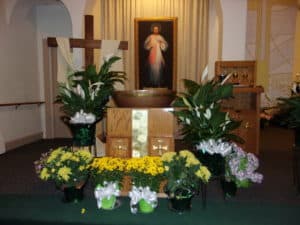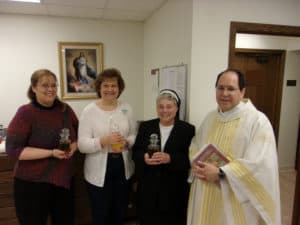This Divine Mercy Sunday Franciscan Gospel reflection and questions are written by Fr. Paul Gallagher, OFM. They are edited by Franciscan Sister of Christian Charity Sister Anne Marie Lom and Joe Thiel. The excerpts from the Sunday readings are prepared by Joe Thiel. If you would like to read or download the complete pdf with excerpts for your prayer, please click here: Franciscan Gospel Reflection April 8 2018 Excerpts from the Lectionary for Mass for Use in the Dioceses of the United States of America, second typical edition © 2001, 1998, 1997, 1986, 1970 Confraternity of Christian Doctrine, Inc., Washington, DC. Used with permission. All rights reserved. No portion of this text may be reproduced by any means without permission in writing from the copyright owner. Please include this information when printing.
Photos: Christ Our Light Parish, Cambridge, Ohio
John 20:19-31
On the evening of that first day of the week, when the doors were locked, where the disciples were, for fear of the Jews, Jesus came and stood in their midst and said to them, “Peace be with you.” When he had said this, he showed them his hands and his side. The disciples rejoiced when they saw the Lord. Jesus said to them again, “Peace be with you. As the Father has sent me, so I send you.” And when he had said this, he breathed on them and said to them, “Receive the Holy Spirit. Whose sins you forgive are forgiven them, and whose sins you retain are retained.”
Thomas, called Didymus, one of the Twelve, was not with them when Jesus came. So the other disciples said to him, “We have seen the Lord.” But he said to them, “Unless I see the mark of the nails in his hands and put my finger into the nail marks and put my hand into his side, I will not believe.”
Now a week later his disciples were again inside and Thomas was with them. Jesus came, although the doors were locked, and stood in their midst and said, “Peace be with you.” Then he said to Thomas, “Put your finger here and see my hands, and bring your hand and put it into my side, and do not be unbelieving, but believe.” Thomas answered and said to him, “My Lord and my God!” Jesus said to him, “Have you come to believe because you have seen me? Blessed are those who have not seen and have believed.”
Now Jesus did many other signs in the presence of his disciples that are not written in this book. But these are written that you may come to believe that Jesus is the Messiah, the Son of God, and that through this belief you may have life in his name.
Background
Most Westerners have become accustomed to a world of visible information. Researchers have discovered that some learn best when information is presented visually, while others learn by doing. There are those who seem to take great pride in being people who want to see for themselves. Exemplifying this, Missouri is known as the “show me state.” Through the capabilities of technology, we can search the bottom of the sea for a missing plane, the vastness of outer space, or the events that are taking place in the middle of the night on the other side of the earth. This same technology can be used to deceive, cover up, and convince us that we are exploring real things that in truth exist only in our imaginations. Think of the powerful experience of 3D movies that are available in many parts of the world. This ability to see and learn about our world is so much a part of our daily life that we do not even notice that we are using these powerful tools of technology. Obviously, this was not part of the world in which Jesus or the early disciples lived.
Unlike the synoptic gospels, John’s gospel does not contain a Last Supper/Passover account. Instead, John precedes the passion and death of Jesus with a farewell address. As part of this address Jesus says, “My peace I leave with you; my peace I give to you. Not as the world gives do I give it to you. Do not let your hearts be troubled or afraid. You heard me tell you, ‘I am going away and I will come back to you.’ If you loved me, you would rejoice that I am going to the Father; for the Father is greater than I.” (John 14:27-28) Later in that discourse Jesus again addresses the disciples, “you also are now in anguish. But I will see you again, and your hearts will rejoice, and no one will take your joy away from you. On that day you will not question me about anything.” (John 16:22-23a) In the text for this Sunday, John describes how Jesus has fulfilled what he said in that farewell address.
The gospel text is composed of two almost identical appearances of the risen Lord. Both appearances take place on the first day of the week. The disciples are gathered, the doors are locked, Jesus appears in their midst, he greets them with the greeting of peace, and he shows them the wounds of the crucifixion. The repetition of these details draws attention to the ways the two appearances are different. Perhaps the most noticeable difference is the absence of Thomas in the first appearance. When he his told by the others that Jesus has appeared to them, he refuses to accept their testimony, and he refuses to accept them as credible witnesses of the truth of their testimony. Even if the others have seen the risen Jesus, he will not believe unless he can not only see but touch the wounds. Thus, the second difference is that Thomas is invited by Jesus to touch the wounds of the crucifixion. Another difference is the kind of response the disciples and Thomas have to the presence of the risen Christ. In the first account, the disciples are filled with joy. In the second appearance, Thomas responds with a statement of faith in Jesus as his Lord and his God. The last difference is in the way the appearance impacts those beyond the event itself. In the first incident, Jesus commissions the disciples to be instruments of God’s forgiveness. In the second appearance, Jesus refers those who believe, but have not had the unique experience of Thomas and the disciples–he calls them blessed.
Reflection Questions
1. Where in your life are you in need of reassurance or a sense of peace?
2. Do you recall an incident when others doubted your truthfulness?
3. What do you think it was like to be in the room with the early disciples before Jesus entered?
4. How do you think the disciples felt when Thomas told them that not only does he not believe them, but that he will never believe unless he touches the wounds of Jesus?
5. How would you be different if the story of Thomas would have been omitted?
6. How would the church have been different if the disciples would have asked Thomas to either accept their testimony or leave?
7. How is your faith different because you have doubts?
8. If Jesus is inviting you, like Thomas, to come touch his wounds, how might you do that?
9. Can you take some time today to talk to God about your need for peace, or the role of Thomas in this gospel, or some other aspect of your relationship with God that arose in this gospel?




